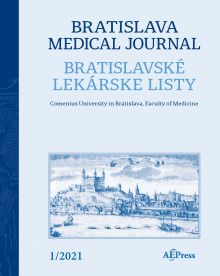Journal info
|
||||
Select Journal
Journals
Bratislava Medical Journal 2024 2023 2022 2021 2020 2019 2018 2017 2016 2015 2014 2013 2012 Ekologia - Ecology Endocrine Regulations General Physiology and Biophysics Neoplasma Acta Virologica Studia Psychologica Cardiology Letters Psychológia a patopsych. dieťaťa Kovove Materialy-Metallic Materials Slovenská hudba 2025Webshop Cart
Your Cart is currently empty.
Info: Your browser does not accept cookies. To put products into your cart and purchase them you need to enable cookies.
Bratislava Medical Journal Vol.118, No.3, p.175-178, 2017 |
||
| Title: Transforming growth factor beta-1 An important biomarker for developing cardiovascular diseases in chronic renal failure | ||
| Author: E. Avci, G. Alp Avci, B. Ozcelik, S. Coskun Cevher, M. Suicmez | ||
| Abstract: OBJECTIVE: Our study focuses on the determination and evaluation of TGF-β1 levels of patients receiving hemodialysis treatment because of chronic renal failure. BACKGROUND: Chronic renal failure, characterized by irreversible loss of renal function, is a major public health problem in the world. Transforming growth factor-beta is a multifunctional cytokine involved in the cellular growth, differentiation, migration, apoptosis and immune regulation. Among the three TGF-β isoforms, TGF-β1 plays a key role in the pathogenesis of renal diseases. METHODS: We studied 24 patients who were on regular hemodialysis, with non-diabetic nephropathy. 20 healthy people who proved to be in a good state of health and free from any signs of chronic diseases or disorders were enrolled as a control group. Serum samples were collected both before and after hemodialysis treatment from each patient. TGF-β1 levels were determined by Enzyme Immunoassay method. RESULTS: TGF-β1 levels were found significantly higher in the hemodialysis patients than those of the control groups. Also, the TGF-β1 was significantly reduced after hemodialysis treatment but it was still higher than in control groups. CONCLUSION: This result indicates that hemodialysis is an effective treatment method to decrease the serum TGF-B1 levels. Nevertheless, this decrease is not enough to reduce existing risks (Tab. 1, Fig. 2, Ref. 28). |
||
| Keywords: chronic kidney disease, cardiovascular disease, hemodialysis, transforming growth factor beta | ||
| Published online: 14-Mar-2017 | ||
| Year: 2017, Volume: 118, Issue: 3 | Page From: 175, Page To: 178 | |
| doi:10.4149/BLL_2017_035 |
||
|
|
 download file download file |
|

